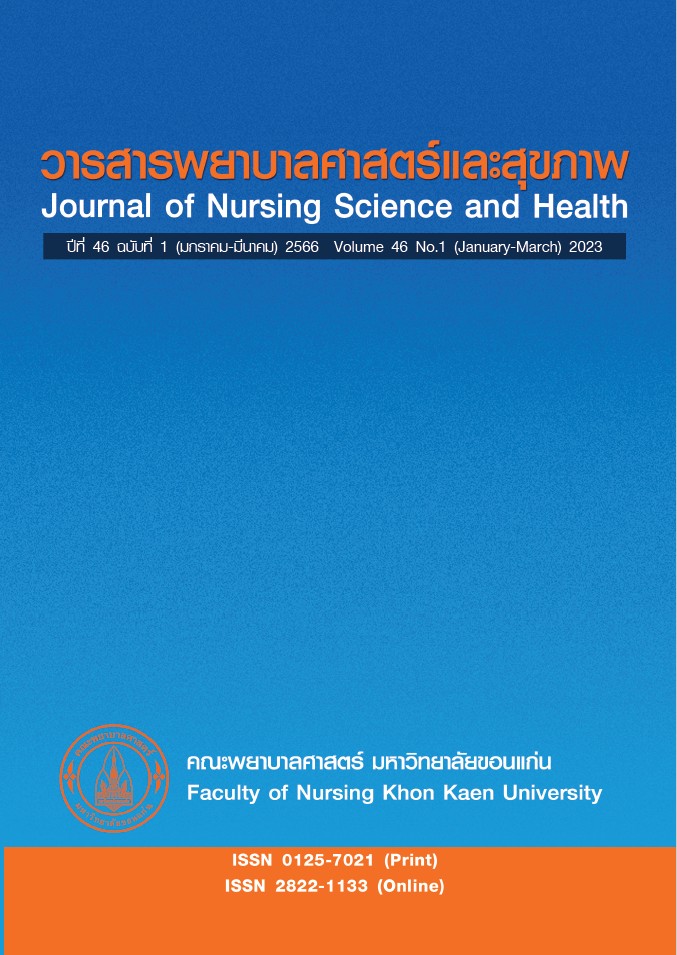ทัศนคติด้านบทบาทชายหญิงแบบเท่าเทียมและความสำเร็จในการเป็นมารดาของมารดาวัยรุ่นหลังคลอดในสถานการณ์แพร่ระบาดของเชื้อโควิด-19
คำสำคัญ:
ความสำเร็จในการเป็นมารดา , ทัศนคติด้านบทบาทชายหญิง , มารดาวัยรุ่นบทคัดย่อ
การศึกษาแบบภาคตัดขวางเพื่ออธิบายความสำเร็จในการเป็นมารดา ทัศนคติด้านบทบาทชายหญิงแบบเท่าเทียม และศึกษาความสัมพันธ์ระหว่างทัศนคติด้านบทบาทชายหญิงแบบเท่าเทียมกับความสำเร็จในการเป็นมารดาวัยรุ่นหลังคลอด รวบรวมข้อมูลด้วยแบบสอบถามในมารดาวัยรุ่นหลังคลอดจำนวน 263 คน ระหว่างเดือนกันยายน 2564 ถึง เดือนเมษายน 2565 ผลการศึกษาพบว่า ความสำเร็จของการเป็นมารดาและทัศนคติด้านบทบาทชายหญิงแบบเท่าเทียมของมารดาวัยรุ่นมีคะแนนเฉลี่ยในระดับสูง (Mean=4.57,SD.=0.64; Mean =4.17, SD.= 0.92) ทัศนคติด้านบทบาทชายหญิงแบบเท่าเทียมมีความสัมพันธ์ในทิศทางบวกกับความสำเร็จในการเป็นมารดาวัยรุ่นอย่างมีนัยสำคัญทางสถิติ (p-value < 0.01) ผลการศึกษาแสดงให้เห็นว่าควรส่งเสริมให้มารดาวัยรุ่นมีทัศนคติด้านบทบาทชายหญิงแบบเท่าเทียม ร่วมกับการสนับสนุนทางสังคมอื่นๆเพื่อส่งเสริมความสำเร็จในการเป็นมารดาวัยรุ่นหลังคลอด
คำสำคัญ ความสำเร็จในการเป็นมารดา ทัศนคติด้านบทบาทชายหญิง มารดาวัยรุ่น
เอกสารอ้างอิง
Koire A. Mittal L. Erdei C. Liu CH. Maternal-fetal bonding during the COVID-19 pandemic. BMC Pregnancy Childbirth 2021;21(1):1-10.
Molgora S, Accordini M. Motherhood in the time of coronavirus: The impact of the pandemic emergency on expectant and postpartum women’s psychological well-being. Front Psychol 2020;11(October):1–16.
SmithBattle L, Freed P. Teen mothers' mental health. MCN Am J Matern Child Nurs 2016;41(1):31-6.
Shrestha S, Adachi K, Petrini MA. Maternal role: A concept analysis. J Midwifery Reprod Heal 2019;7(3):1732–41.
Panthumas S, Kittipichai W, Chamroonsawasdi K, Taechaboonsermsak P. Antecedent factors of maternal identity among primiparous Thai teenage mothers. J Heal Res. 2019;33(4):336–48.
Javadifar N, Majlesi F, Nikbakht A, Nedjat S, Montazeri A. Journey to motherhood in the first year after childbirth. J Family Reprod Health. 2016 Sep;10(3):146.
Mercer RT. Becoming a mother versus maternal role attainment. J Nurs Scholarsh. 2004;36(3):226–32.
Branjerdporn G, Meredith P, Strong J, Garcia J. Associations between maternal-foetal attachment and infant developmental outcomes: A systematic review. Matern child health J. 2017;21(3):540–53
Nakamura Y, Takeishi Y, Ito N, Ito M, Atogami F, Yoshizawa T, et al. Comfort with motherhood in late pregnancy facilitates maternal role attainment in early postpartum. Tohoku J Exp Med. 2015;235(1):53–9
Heydarpour S, Keshavarz Z, Bakhtiari M. Factors affecting adaptation to the role of motherhood in mothers of preterm infants admitted to the neonatal intensive care unit: A qualitative study. J Adv Nurs 2017;73(1):138-48. doi: 10.1111/jan.13099.
Maçola L, do Vale IN, Carmona EV. Avaliação da autoestima de gestantes com uso da escala de autoestima de rosenberg. Rev da Esc Enferm 2010;44(3):570–7.
Kaewjiboon J, Saetang O, Chachvarat T. Factors related to maternal role of teenagers. J Nursing Public Heal Educ 2019;20(3):95–106. (in Thai)
Thammarat R, Supprasri P, Siriarunrat S. Factors associated with the maternal role attainment of teenage muslim mothers. Princes Narathivas Univ J 2017;9(3):37–47. (in Thai)
Fasanghari M, Kordi M, Asgharipour N. Effect of maternal role training program based on Mercer theory on maternal self-confidence of primiparous women with unplanned pregnancy. J Educ Health Promot. 2019;1-8.
Konyoo K, Kantaruksa K, Chaloumsuk N. Effectiveness of maternal role attainment enhancement among adolescent mothers : A systematic review. Nurs J (Manila) 2020;47(2):204–15. (in Thai)
Kordi M, Fasanghari M, Asgharipour N, Esmaily H. The effect of maternal role training program on role attainment and maternal role satisfaction in nulliparous women with unplanned pregnancy. J Educ Health Promot 2017;6:61. doi: 10.4103/jehp.jehp_113 _15
Zhou M. Motherhood, employment, and the dynamics of women’s gender attitudes. G&S 2017;31(6):751–76.
Dotti Sani GM, Quaranta M. The best is yet to come? Attitudes toward gender roles among adolescents in 36 countries. Sex Roles 2017;77(1–2):30–45.
Gadallah M, Roushdy R, Sieverding M. Young people’s gender role attitudes over the transition to adulthood in Egypt. J Chem Inf Model [Internet]. 2017;53(9):1–25.
Armitage CJ, Christian J. From attitudes to behavior: Basic and applied research on the theory of planned behavior. In Planned behavior 2017 Jul 5 (pp. 1-12). Routledge.
Panthumas S, Kittipichai W. Validation of the maternal identity scale for primiparous Thai teenage mothers. Asian Nurs Res (Korean Soc Nurs Sci) 2019;13(1):69–75.
Zeynelolu S, Terzlu F. Development and psychometric property gender roles attitude scale. J Educ 2011;40:409–20.
Ativanichayapong N. Livelihood of people in rural Isan: Changes over the past decade. JAS 2014;33(2):103-27.
Perales F, Jarallah Y, Baxter J. Men’s and women’s gender-role attitudes across the transition to parenthood: Accounting for child’s gender. Soc FORCE 2018;97(1):251–76.
ดาวน์โหลด
เผยแพร่แล้ว
รูปแบบการอ้างอิง
ฉบับ
ประเภทบทความ
สัญญาอนุญาต
ลิขสิทธิ์ (c) 2023 วารสารพยาบาลศาสตร์และสุขภาพ

อนุญาตภายใต้เงื่อนไข Creative Commons Attribution-NonCommercial-NoDerivatives 4.0 International License.
วารสารพยาบาลศาสตร์และสุขภาพเป็นเจ้าของลิขสิทธิ์ในการเผยแพร่ผลงานที่ตีพิมพ์ห้ามผู้ใดนำบทความที่ได้รับการตีพิมพ์ในวารสารพยาบาลศาสตร์และสุขภาพไปเผยแพร่ในลักษณะต่าง ๆ ดังนี้ การนำบทความไปเผยแพร่ออนไลน์ การถ่ายเอกสารบทความเพื่อกิจกรรมที่ไม่ใช่การเรียนการสอน การส่งบทความไปตีพิมพ์เผยแพร่ที่อื่น ยกเว้นเสียแต่ได้รับอนุญาตจากวารสารพยาบาลศาสตร์และสุขภาพ



